From Mr. C to Dr. M: M4 Evan Mercer connects with all ages
Fourth-year student Evan Mercer matched into med-peds at Vanderbilt on Friday, March 18, 2022
By: Lexie Little
Leaves crunched under football fans’ feet as they converged toward Jess Neely Drive to see the Vanderbilt Commodores make their way to the stadium. Adults and children alike lined the street as the Spirit of Gold Marching Band struck up “Dynamite” to ignite excitement for a Southeastern Conference showdown in Nashville, the city that hosted the first collegiate football game in Tennessee in 1890.
Kids jostled between rows of alumni, students, and fans to get to the front. Then, Mr. Commodore, a.k.a. “Mr. C,” the humanoid costumed mascot, made his way down the path toward the stadium entrance. As he approached some children with their parents, a boy shied away, peeking around his mother’s leg. Mr. C crouched to eye level with the young fan, waved, and reached out his hand. Because mascots do not speak, Mr. C had to rely solely on nonverbal cues to signal he meant no harm. The boy smiled, gave Mr. C a high five, and began to cheer.
Fast forward four years. A Vanderbilt medical student with a stethoscope hanging around his neck walks in to see a pediatric patient. The child sits on the exam table with a parent close by. Unnerved by the people in scrubs and white coats rotating in and out, the patient feels frightened. Then, the medical student crouches down to be at eye level, waves, and reaches out his hand.
Evan Mercer has always been able to put people at ease.
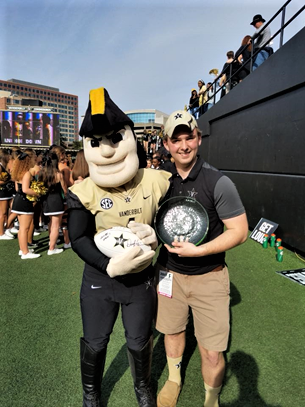
“Part of being the mascot is not talking at all while you’re in the suit,” he said of his experience as Mr. C. “You really have to rely on big, outrageous motions to interact with people – everything outside of the normal way to communicate with people. You really have to get creative, especially in loud settings like a football game. If there’s a kid that’s scared to interact with you, you have to figure out how to approach this kid and play with him without terrifying him. It was one of the most formative ways of building my nonverbal communication. It was a lot of improv that helped me learn how to interact with people in the moment. As things come up, you have to be able to react on a split-second basis – you have to figure out what to do in that moment to have the best interaction or the best outcome [not unlike patient care in a clinical setting].
“If there’s a kid that’s terrified of the mascot, I would get small, I would get down cross-legged or get on a knee and hold out a hand. I’d play with other kids more comfortable with me to get them to be more relaxed with me, too. I think that’s what sparked my interest in med-peds. I really like working with adult and kid populations, trying to find the best way to interact with each person, whether they’re a kid or adult. Mr. Commodore fed into that med-peds experience.”
Finding his path through people
A Marietta, Georgia, native, Mercer grew up near the homebase of the chicken chain Zaxby’s. He had donned the big yellow chicken suit to advertise the food while in high school. Little did he know he would one day smile beneath other masks to advertise human care and compassion.
During his junior and senior years as a Vanderbilt University undergraduate, Mercer served as Mr. C on the spirit team. He regularly appeared at athletics and community events, greeting fans, hyping up the crowd, and acting as a representative of an SEC institution. When he first arrived on campus, he wanted to pursue a career in journalism, hoping to enter the arena of sports broadcasting, where he would cover games instead of working the sidelines. He chatted with national college football reporters like Dan Wolken of USA Today, but the occupation just didn’t seem to click.
Through his interactions as Mr. C, Mercer developed a deeper appreciation for people.
And though he would certainly connect with people as a reporter, he discovered another opportunity that felt like a better fit: medicine.
“I shadowed at a clinic in the Georgia area and found [medicine] was pretty cool. It was a Good Samaritan clinic. I did a lot of dental care and free primary care. I got to see different aspects of medicine and thought, ‘Okay, I think I can do medicine.’ So, it took me a couple of years in undergrad [to figure out my path], but I made that switch, and it worked out,” he said.
Continuing to be a representative
Equipped with a passion for people and medicine, he entered Vanderbilt University School of Medicine following his studies in communication and neuroscience. He immediately found new friends in Chapman College, one of four medical student communities led by two faculty members and two senior medical students, known as Student Affiliate Advisers (SAA).
Each year, the Colleges engage in a friendly competition for the coveted College Cup through a series of events like basketball, soccer, volleyball, skits, gym decorating, and a 5K run. In 2018, Mercer entered the gym with his classmates and Chapman College faculty mentor Dr. Beth Ann Yakes.
Oddly enough, Mercer once again ended up in a costume.
“Evan has been such an important part of Chapman College since his first year in medical school,” Yakes said. “I still remember Evan requesting to wear the Chapman Dragon mascot costume at his first college cup as a first-year student. He told us that he’d served as the Vanderbilt Commodore mascot in undergrad, and he wanted to share the same spirit of joy and energy with his medical school colleagues as he had with his undergraduate friends. Evan was truly spectacular as our Chapman Dragon. His energy and enthusiasm were infectious as he rooted on the Chapman athletes, excited the audience, and ran with the Chapman flag across the gym floor.”
That spirit for his community within VUSM continued throughout his time as a medical student. Mercer currently serves as a Student Affiliate Adviser, working to foster a sense of support for each member of Chapman College. As an SAA, Mercer checks in on assigned first- and second-year mentees throughout the year, helps to plan events like College Cup, acts as a representative for Chapman at major functions, and updates faculty advisers on activities and event plans.
Yakes appreciates his continued efforts.
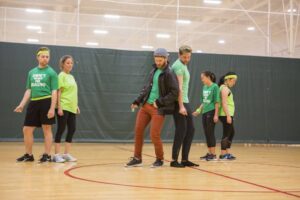
“[Evan] has been a constant support and encouragement to his classmates in so many other settings,” Yakes said. “He actively participated in our learning communities classroom settings, created hilarious videos for Cadaver Ball and could be counted on to show up to college community events. As he progressed through medical school, he made sure to get to know the new Chapman students, welcoming them with his warm smile and genuine interest in their story. As our lead Student Affiliate Advisor this year, Evan has worked tirelessly to engage his fellow Chapman students in building community and relationships, even in the face of COVID. I have no doubt he will be a successful physician, colleague and teacher and I look forward to seeing all that he accomplishes.”
From his first days at VUSM, Mercer sought to leave a legacy of caring and compassion in his community, getting involved in initiatives to augment content related to diversity, equity, and inclusion in the first-year curriculum. He wants to make sure each student feels welcome and each patient feels like they’ve been heard, though in a literal sense, he might, on occasion, ask them to repeat their concerns.
Discovering his voice
Around age four, doctors diagnosed Mercer with sensorineural hearing loss, a condition in which inner ear damage or problems with nerve pathways cause hearing loss or deafness. Mercer is deaf in his left ear and partially deaf in the right. For perspective, he could not hear a blaring car horn if he pressed his ear against the hood, much less anyone trying to speak to him.
“I missed a lot of the critical learning experiences,” he said. “It took me a while to learn how to talk. I had to do a lot of practice with speech therapy. My mom did cool daily exercises with me. My lips and tongue were underdeveloped because I hadn’t been using them to talk at all. I’d be doing these daily exercises like pushing a Goldfish through my mouth or untwisting a Twizzler with my tongue. Once I was able to develop that more into talking, I would practice speeches like Winston Churchill’s ‘Blood, Toil, Tears, and Sweat’ speech. I would recite that speech to my family every couple of nights and practice the words with them. That was the start of it all. I didn’t know it yet, but that was the beginning of my journey with communicating.”
Experts gave Mercer’s parents little hope for their young son’s future. His physicians said if he held a job at all, he would likely be in an occupation that required no interpersonal interaction or communication. Undeterred, his mother encouraged his communication, teaching him to say his first word – milk – at five years old. As he grew older, his proficiency likewise grew. He ordered for himself at restaurants (no matter how many tries it took), read the labels on cereal boxes aloud, and repeatedly practiced any words he missed.
Now, he has the language to offer hope and reassurance to families facing the same anxieties his family faced.
“I’m not afraid to talk about my deafness at all,” he said. “I’ve been able to talk with plenty of other deaf students and deaf peers or colleagues. I talk about my experience of having this late diagnosis and having to go through these tough times and overcoming that to end up in medical school.”
Leading with visibility
More than two decades later, Mercer speaks to students, faculty, and staff about diversity and disability, demonstrating that – as he said – “disability is not lack of ability.” He gave one of two student lectures on March 7, 2022, as part of the Flexner Deans’ Lecture Series at VUSM.
More broadly, Mercer seeks to reframe conceptions of medical professionals to include practitioners with disabilities, visible and invisible alike.
“There’s a perception that doctors have to be absolutely perfect mentally and physically because they’re taking care of people [with lives in their hands],” he said. “There’s a sort of stigma against revealing whether or not you have a disability because some people might think of disability as a flaw or imperfection – but it’s not. I want to be able to challenge the notion that just because you have a disability doesn’t mean you are any less of a physician or a person. In fact, I think it makes you a better provider because you have that experience to connect with your patients or coworkers and team as a whole. You have that insight that nobody else would be able to share. I think it allows you to step forward and advocate for people who wouldn’t otherwise have a voice or that chance to be advocated for.”
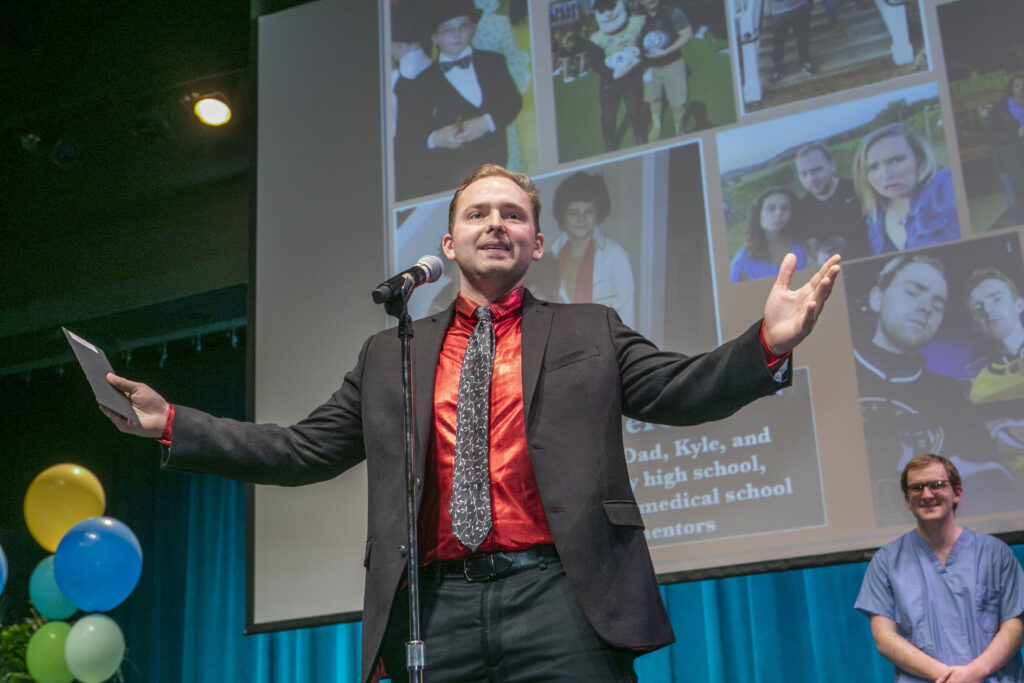
Early on, medical stereotypes clouded Mercer’s thoughts about becoming a doctor. He thought about the need for physicians to hear the heart and lungs clearly through a stethoscope. He didn’t know how he could do that.
Luckily, two people showed him how in different ways.
First, Mercer traveled to Johns Hopkins University in Baltimore, Maryland, where research professor of biomedical engineering Tilak Ratnanather connected him to a community of physicians and researchers with deafness or other disabilities. Mercer studied schizophrenia with Ratnanather, who also lives with hearing loss, as part of a summer research experience. He stood as a representative for professionals with disabilities that Mercer had yet to encounter in medicine.
“I think the most important part of that summer was him putting me in touch with a lot of other physicians with deafness or disabilities to show me that I could still do that,” he said. “I have a special stethoscope that amplifies the noise so I can hear it. I can still do everything that a person with regular hearing can do, too. It was cool to see Tilak, with such severe deafness as well, doing all this incredible stuff and being a mentor for everyone else. He was a big inspiration for me.”
Later, when Mercer arrived at Vanderbilt for medical school, the late Dr. Michael Fowler showed him how to use the stethoscope provided by the School of Medicine. Mercer remembers both gestures as generous, helping to shape his formative days as a doctor-in-training, when he was just starting to learn about detecting signs and symptoms, and taking early steps toward making diagnoses.
Fowler, who directed the physical diagnosis course, took a hands-on approach to training Mercer, showing him how to use his amplified stethoscope in ways that differed from general practice with a regular model.
Equipped with an essential tool for medicine and the knowledge that he could succeed in a clinical space, Mercer spent part of his first year in an ENT (ear, nose, and throat) continuity clinic with Dr. David Haynes, professor of otolaryngology and hearing and speech sciences. There, Mercer put his new skills to the test while acting as a reassuring figure for families.
“I was placed in a clinic with an ENT doctor who saw a lot of children who had just gotten cochlear implants or had hearing loss,” he said. “Often times, parents came in really uncertain about what to do with their children, our patients. It’s a big change. All of the sudden, their kids can’t hear anymore, and they don’t know what to do. I appreciated Dr. Haynes, my attending, who asked me to talk to them about my own experiences and show them that though their kid might not be able to hear as well, that’s not going to change anything. They can still do anything they want while living with hearing loss.”
Preparing for a people-driven future
Mercer informed his conversations with parents both through personal experience and prior interactions with children with hearing loss. Mercer and his brothers had worked with deaf elementary school students in underserved areas of Georgia. The group they called the “Mercer Maniacs” practiced talking while working through activities like science experiments, pitching tents, or building bird houses. The Mercers encouraged the students to lead the projects, asking them to be the communicators as they worked through each step.
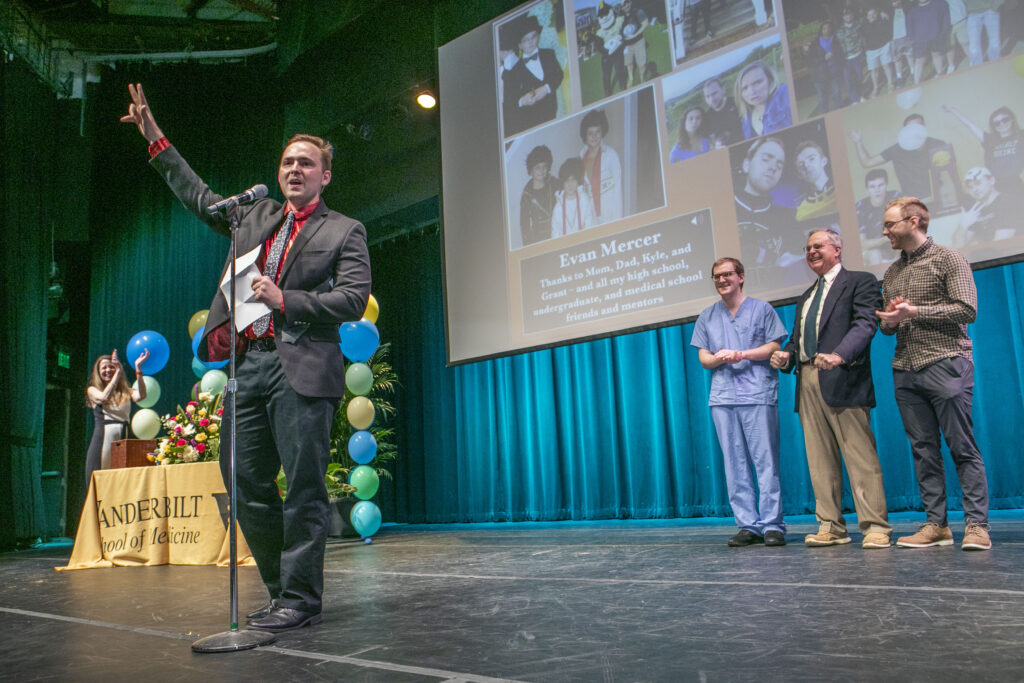
Grant Mercer, the youngest of three and a second-year Vanderbilt MD student, watched his older brother with admiration. He stills looks to Evan for leadership.
“Evan is a great big brother, someone I can always depend on to have my back,” Grant Mercer said. “He has given me some excellent advice on how to thrive in medical school. I never really thought of Evan as being someone with a disability because his lack of hearing never stopped him from doing whatever he wanted. He’s fearless that way. From dancing to ‘Crazy Train’ in the middle of the football field as Mr. Commodore to skiing down a black diamond slope that petrified the rest of the family, Evan is always just Evan. Hearing loss has never stood in his way.”
Soon Mercer will enter practice as a resident physician at Vanderbilt, where again he will work to holistically address patient concerns openly and honestly, though sometimes the conversation might be difficult.
“We need to be able to talk about [disability] openly,” he said. “It can be an uncomfortable topic to talk about. One of my main goals has been just opening up the field to everybody and saying, ‘Yes, I am deaf, and I’m okay with that. Here’s my story, here’s what I went through, and here’s all the cool things I’ve done with it.’ That was the first step. Now, I’m trying to explore that further. Now that I’m preparing for residency and getting ready to be in the hospital, I’m thinking about how to take that [conversation] to the next level.
“I want to be able to talk about it openly for multiple reasons. For a practical reason, I want to let [patients] know ‘Hey, I’m hard of hearing. I might not hear everything you say and could ask you to repeat sometimes.’ But also from a representation standpoint to say, ‘I am your doctor, but at some point, I’ve also been a patient. I know what you’re going through at this moment. We can work through this together because we have that shared experience.’ I think that will be very important. But at the same time, do I need to reveal it? It goes back to that latter invisibility standpoint. What do I need to do to show that I’ve had that experience before, too? I err on revealing it just for the practical and representation standpoint, but I do wonder sometimes why I feel a need to ‘reveal’ part of me [like it’s a secret to be kept] …Successful people with disabilities in medical professions are not anomalies.”
Though in the past Mercer has masked his identity beneath costume heads and behind clinical masks, he cannot hide his passion for uplifting others. He makes himself visible, wanting to inspire others to stand for all people regardless of ability.
“Disability does not limit me,” he said. “And I believe everyone can take that message to elevate others – make them be seen as more than just a person with a disability.”
Mercer can be whoever he wants: a chicken, a dragon, a Commodore, a doctor. But for now, as he reflects on the end of his medical school career, Mercer is content being a friend, saying each VUSM memory stands as a favorite because of the people he met during orientation, at faculty dinners, in Chapman College and through chats between classes – the people who heard him and supported his journey and for whom he likewise advocated.
He’ll even take on yet another role as a master of ceremonies for the wedding of classmates Claire Lo and Seth Reasoner this spring.
“Evan has a gift for connecting,” Lo said. “Talking to him makes you feel seen and appreciated, and I’ve never heard him speak ill of someone else. Evan will be a simply outstanding physician and I’m grateful for his friendship.”
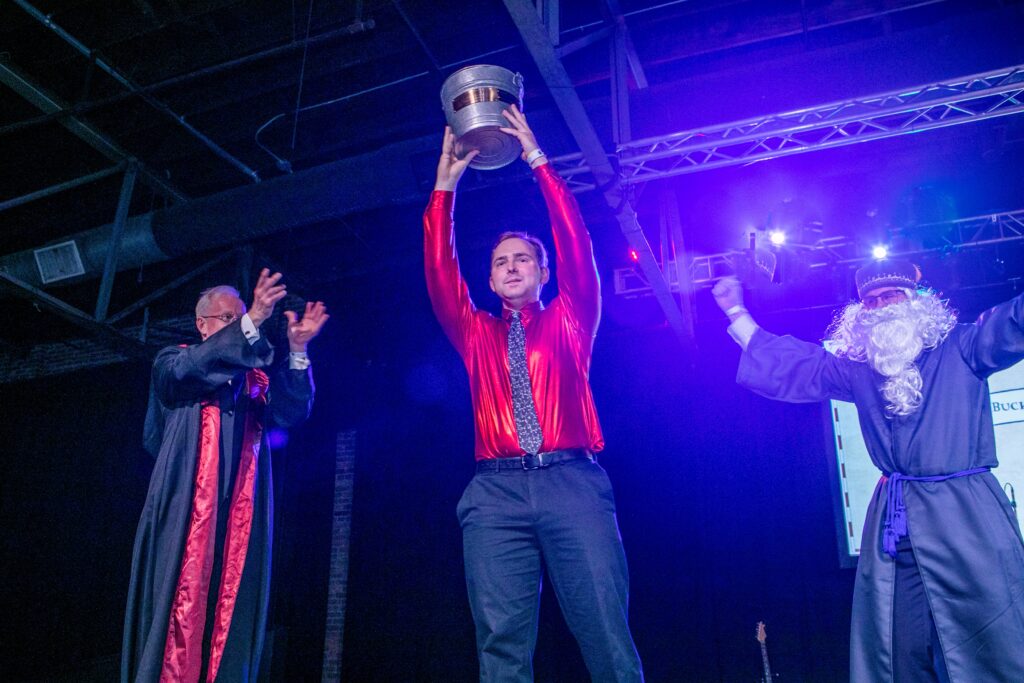
Fellow students agreed with Lo, acknowledging Mercer’s kindness and tenacity with this year’s Bucket Award, which M4 students annually present to their classmate who has handled medical school challenges with the most grace.
Though he might not hear or speak right away, Mercer will always offer an outstretched hand regardless of age or ability.